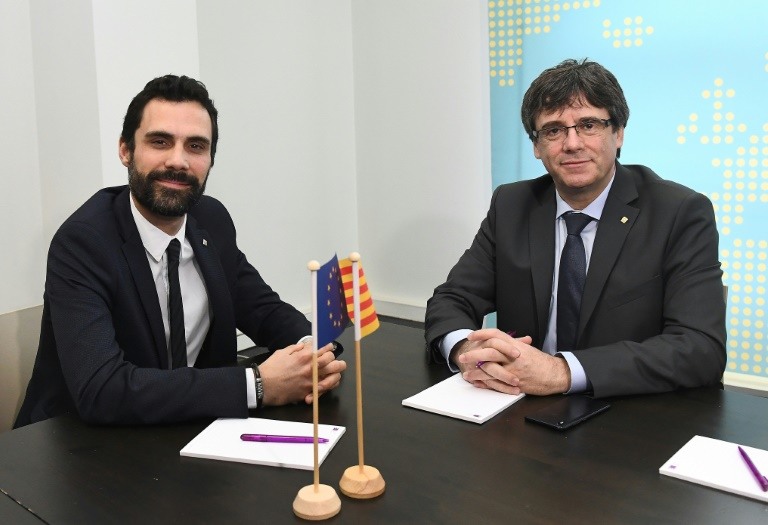
The speaker of Catalonia's parliament defended ousted separatist president Carles Puigdemont on Wednesday as the region's legitimate leader, as question marks remain over how he will be able to take power from self-exile in Belgium.
"President Puigdemont has every right... to be voted in," Roger Torrent told reporters after meeting Puigdemont in Brussels despite efforts by Spain's central government to prevent the talks.
He was referring to a parliamentary session due later this month that will see lawmakers vote for or against Puigdemont, who has been formally designated as candidate to lead Catalonia again after December elections saw separatist parties win an absolute majority.
But Torrent gave no indication as to how Puigdemont, who was sacked by Madrid in October after attempting to break away from Spain, planned to achieve this, nor when the session would take place.
Parliamentary legal experts insist Puigdemont must be physically present at the session, but if he returns to Spain he faces prison on charges of rebellion, sedition and misuse of public funds for his role in the independence drive.
- Attempt to stop talks -
Puigdemont had originally been due to meet with Torrent and four other members of his sacked government at Catalonia's trade mission in Brussels.
But they were forced to move the meeting to another nearby location after Spain's central government ordered Catalonia's representative in Brussels not to allow it to take place at the mission.
The gathering comes just two days after Torrent - who is also pro-independence - proposed Puigdemont as president of Catalonia following a snap election in December in which separatist parties again won an absolute majority led by his grouping.
Puigdemont has said he could be sworn in remotely from Brussels, a plan Spain's central government opposes.
On Wednesday morning, Prime Minister Mariano Rajoy told Spanish radio he would "go to the Constitutional Court" if that happened.
But Puigdemont would rather return to Spain.
On Wednesday, he said he should be present at the parliamentary session.
But the central government is determined to stop this from happening.
On Tuesday, Interior Minister Juan Ignacio Zoido said authorities were "taking steps along the border and inside the country, everywhere, to see that that does not happen."
"We are doing it in such a way that he cannot enter (the Catalan parliament) even in the boot of a car," he told Spanish television.
- Direct control -
Puigdemont went to Belgium at the end of October after the Catalan parliament declared independence.
This was short-lived, however, as Rajoy moved to stop the secession crisis in a region deeply divided over independence.
He imposed direct rule on the semi-autonomous region, sacked its government, dissolved its parliament and called snap elections.
Several days later, separatist leaders were charged for their attempt to break from Spain via a banned independence referendum, but by then Puigdemont and several of his former ministers were already in Belgium.
Deposed vice president Oriol Junqueras, however, remained in Spain and was jailed along with others pending a probe into their role in the independence drive.
Catalonia's official representative in Brussels has been under the authority of Madrid since Spain's central government placed the region under its direct control.
Torrent hit out at Madrid's attempt to stop the meeting with Puigdemont, and said he had asked lawyers at the Catalan parliament to "study the legal consequences of this decision."


